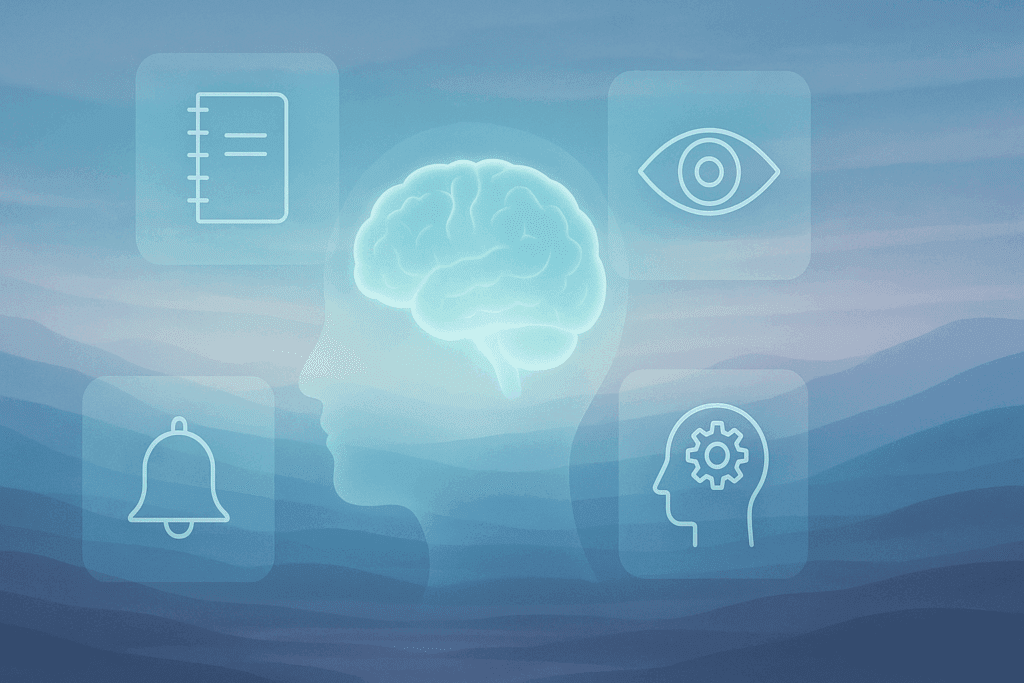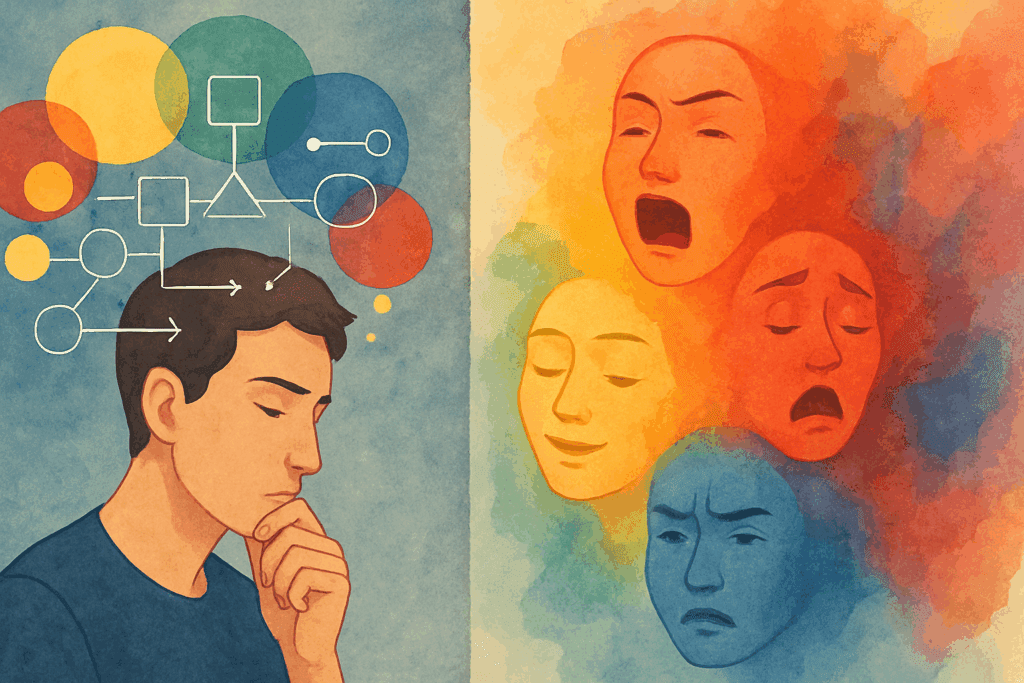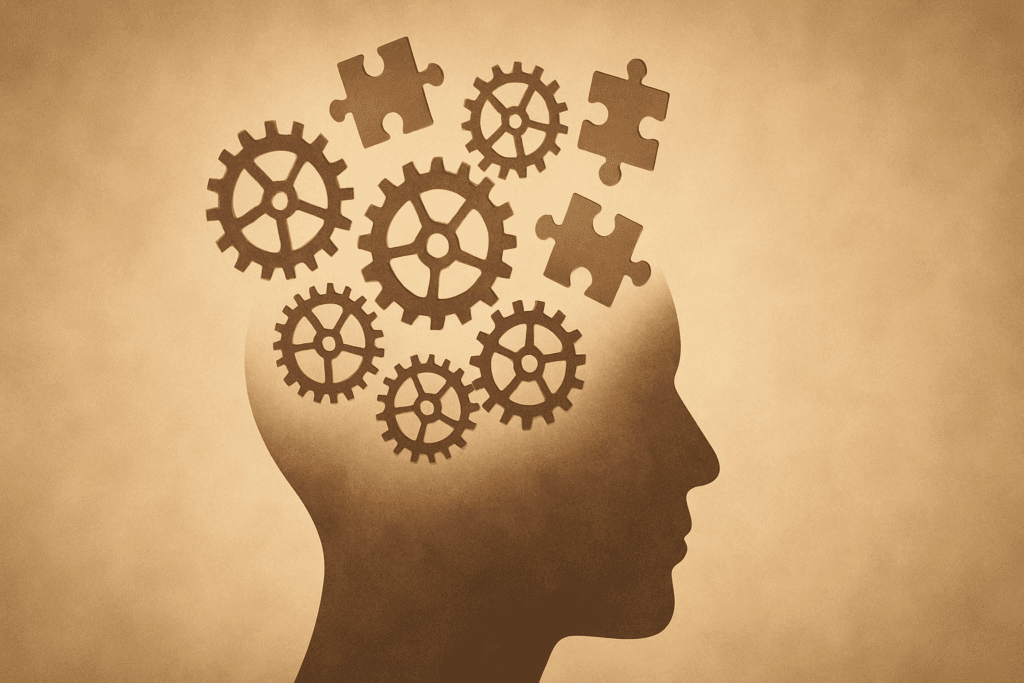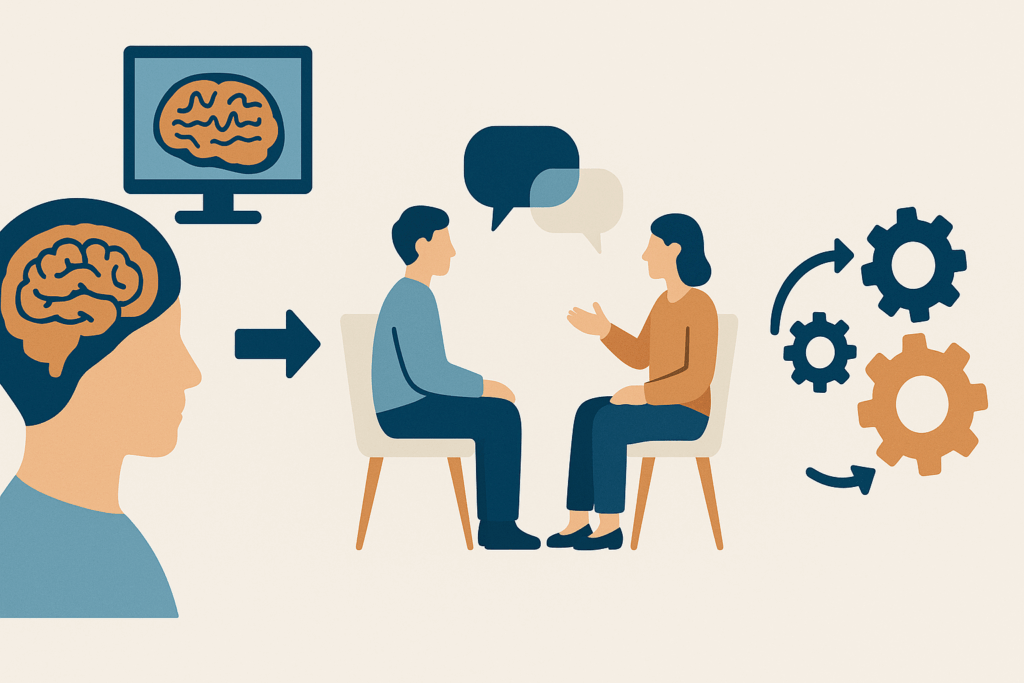
Understanding the Cognitive Mind and Its Role in Mental Wellness
The human brain is not only an organ of biological function but also the central seat of the cognitive mind, where thoughts, emotions, perceptions, and decisions converge. The term “cognitive mind” refers to the constellation of mental processes that govern our ability to learn, remember, pay attention, solve problems, and regulate emotions. These internal activities form the backbone of cognition and directly influence psychological well-being. To understand the relationship between mental health and cognitive function, one must first grasp the cognition definition, which is broadly described as the mental action or process of acquiring knowledge and understanding through thought, experience, and the senses. By exploring this relationship through the lens of cognitive psychology, we gain insights into how our thoughts shape emotional states and behavioral outcomes.
When we define cognitive processes, we are talking about a dynamic system that includes attention, perception, memory, language, and reasoning. Each of these components contributes to how we experience the world and make sense of it. When one or more of these mental processes is impaired or dysregulated, it can manifest in psychological conditions such as anxiety, depression, or cognitive distortions. Understanding the perspective of cognitive psychology is essential in this context because it places mental processing at the center of emotional and behavioral regulation. Rather than viewing mental disorders solely as chemical imbalances or emotional dysfunctions, cognitive psychology encourages us to examine how thought patterns and core beliefs contribute to psychological symptoms.
The description of cognitive psychology, therefore, highlights its emphasis on how people perceive, think, remember, and learn. These processes influence the mental framework that underlies emotional reactions. For example, an individual who interprets a social rejection as a reflection of personal worthlessness is engaging in a form of distorted cognitive processing. A cognitive psychologist would focus on identifying these negative thought patterns and working to reframe them, offering a pathway toward improved mental health. In this way, the cognitive mind is not just an abstract concept but a functional system that can be evaluated, understood, and optimized for better psychological outcomes.
You may also like : Boost Brain Power Naturally: Evidence-Based Cognitive Training Activities and Memory Exercises That Support Long-Term Mental Health

Cognition and Psychology: A Deep Interplay Between Thought and Emotion
In the realm of psychology, cognition and emotional health are deeply intertwined. Cognitive psychology is the study of internal mental processes and how they influence outward behavior. At the heart of this approach lies the recognition that our thoughts shape our emotions more than external circumstances do. This idea underpins many evidence-based therapies used in mental health treatment today, including cognitive-behavioral therapy (CBT), which is grounded in the understanding of cognitive thinking meaning and its impact on mood regulation.
Cognition about cognition, often referred to as metacognition, plays a crucial role in this interplay. It involves being aware of and controlling one’s own thinking processes. People with high metacognitive awareness are better equipped to detect irrational beliefs, self-sabotaging thoughts, and exaggerated fears that may otherwise spiral into mental health disorders. The ability to define cognitive thought in this context means recognizing how we reflect on our thoughts, assess their validity, and adjust them when they contribute to emotional distress. The more refined our cognitive processes become, the more resilient we are in the face of stress and adversity.
This conceptual bridge between cognition and psychology is also evident in research on emotional regulation. Studies have shown that individuals who engage in adaptive cognitive strategies—such as cognitive reappraisal, mindfulness, and problem-solving—tend to have better mental health outcomes. Cognitive psychologists often explore how individuals process emotional stimuli, interpret ambiguous social cues, and form self-concepts, all of which are central to mental wellness. Thus, cognitive thinking definition extends beyond abstract knowledge into practical applications for emotional and psychological resilience.
Understanding what does cognitive mean in psychology requires an exploration of how we make sense of our experiences and respond to them. When these processes become skewed—as in the case of excessive rumination, catastrophizing, or black-and-white thinking—they contribute directly to mental health challenges. Recognizing this connection provides a foundation for therapeutic interventions aimed at helping individuals restructure their cognitive frameworks and foster healthier emotional responses.

Defining Cognitive Constructs in Psychology and Their Mental Health Relevance
To define cognition psychology is to explore how people come to know and understand their environments and themselves through mental processing. This branch of psychology emphasizes the importance of internal representations—mental models that guide perception, attention, and behavior. These representations are shaped by both biological predispositions and life experiences, meaning that cognitive frameworks are as diverse as the individuals who hold them. This individual variation helps explain why people respond so differently to the same stressors or life events.
The cognitive psychology def centers on mental processes such as perception, attention, memory, language, and reasoning, all of which are instrumental in forming the cognitive mind. These mental faculties are not static; they evolve over time and can be trained, refined, or impaired depending on various factors such as age, trauma, education, and mental illness. In clinical settings, understanding these constructs is essential for diagnosing cognitive impairments and developing treatment plans tailored to individual needs.
For instance, someone suffering from major depressive disorder may exhibit distorted thinking patterns such as overgeneralization, personalization, or negative filtering. To address this, therapists often aim to define cognitive distortions and help the patient identify and challenge these patterns. The process involves understanding the meaning behind thoughts, the assumptions they rest upon, and their emotional consequences. This targeted approach aligns with the broader goals of cognitive psychology, which seeks not only to explain how people think but also to enhance the quality of that thinking to improve overall well-being.
The meaning of basic cognitions—such as beliefs about the self, others, and the world—can deeply impact one’s mental health trajectory. These foundational cognitive patterns often emerge in childhood and persist into adulthood unless they are consciously examined and revised. Mental processes involved in evaluating these beliefs include introspection, emotional awareness, and the application of logical reasoning. As these processes become more refined, individuals can begin to see their mental experiences not as fixed realities but as interpretations that can be challenged and changed.

Cognitive Processes and Their Influence on Psychological Functioning
Cognitive thinking meaning involves more than just the ability to analyze or solve problems; it encompasses the entire range of mental operations that influence perception, judgment, memory, and decision-making. These mental processes serve as the filters through which we experience the world and determine our responses to it. When functioning optimally, these processes help maintain emotional balance, facilitate social interactions, and support adaptive behavior. However, when cognitive processes become biased or inflexible, they can distort perception and contribute to mental health issues.
Consider the example of someone who interprets a neutral comment from a coworker as a personal insult. This cognitive distortion may stem from underlying beliefs about self-worth or chronic insecurity. Over time, repeated cognitive misinterpretations like these can erode mental health, leading to chronic anxiety, depression, or relational conflict. What cognitive psychology focuses on in such cases is identifying and correcting these maladaptive thought patterns. Interventions may include thought monitoring, cognitive restructuring, and psychoeducation, all aimed at realigning distorted cognition with reality.
Understanding what does cognitive psychology focus on means looking at both the structure and function of mental processes. It also involves exploring how these processes interact with emotions, behavior, and environmental feedback. For instance, a person experiencing post-traumatic stress disorder (PTSD) may have intrusive thoughts and flashbacks that are maintained by cognitive biases such as selective attention to threat-related cues. By working with a cognitive psychologist, the individual can begin to reframe traumatic memories and develop healthier coping strategies.
Brain cognition, or the neural basis of cognitive functioning, further underscores the importance of this approach. Neuroimaging studies have shown how regions of the brain responsible for executive function, emotional regulation, and memory interact in complex ways. Understanding these connections allows for more targeted interventions, such as cognitive rehabilitation or neurofeedback, which can enhance cognitive functioning and, by extension, mental health. Thus, the interplay between cognition and cognitive processes forms a comprehensive framework for understanding psychological functioning.

The Role of Cognitive Psychologists in Mental Health Treatment
So, what does a cognitive psychologist study in the context of mental health? These professionals focus on understanding how thoughts influence behavior and emotion, with the goal of developing strategies to enhance cognitive flexibility and resilience. They often work in clinical settings, helping patients identify unhelpful thinking patterns and teaching techniques to reframe those thoughts in more constructive ways. This intervention is grounded in empirical research, aligning with the EEAT principles of experience, expertise, authoritativeness, and trustworthiness.
Cognitive psychologists also contribute to the development of assessments used to measure cognitive functioning, such as memory tests, attention tasks, and problem-solving exercises. These tools help clinicians pinpoint specific areas of cognitive weakness that may be contributing to psychological distress. For example, a person with attention deficits may struggle with executive functioning, leading to poor decision-making and increased stress. Understanding these limitations allows for more personalized treatment plans.
Another essential aspect of their work involves researching cognitive therapies and evaluating their effectiveness. Cognitive psychology is the study of how mental operations affect human behavior, and this research extends into various domains including education, clinical psychology, and even organizational behavior. These findings have been instrumental in refining therapeutic approaches that are now standard in mental health care.
By understanding what cognitive psychologists study and applying these insights in therapeutic settings, clinicians can support patients in transforming their thought patterns, increasing emotional regulation, and improving their overall quality of life. Their work highlights the significance of the cognitive mind not only in understanding psychological symptoms but also in promoting mental wellness.
Frequently Asked Questions: How the Cognitive Mind Shapes Mental Health
1. How does understanding the cognitive mind contribute to better emotional regulation?
Understanding the cognitive mind offers individuals a structured way to explore how their thoughts influence emotions and behaviors. Many people experience emotional dysregulation without realizing it originates from distorted interpretations of events, rather than the events themselves. By identifying the role of cognition and psychology in shaping internal reactions, individuals can practice techniques that interrupt unhelpful mental loops. For example, cognitive reappraisal—a skill often taught by a cognitive psychologist—enables a person to reinterpret a stressful situation with a more balanced perspective. Through these practices, the brain learns new ways of responding to challenges, which enhances resilience and emotional clarity over time. This process helps bring awareness to mental processes like automatic thoughts, biases, and underlying assumptions. Unlike simplistic mood-boosting strategies, this approach targets the root mental habits that often maintain emotional suffering.
Moreover, the cognitive mind does not operate in isolation but in continuous feedback loops with bodily sensations and environmental cues. Learning to identify the specific cognitive thinking meaning within emotional experiences can reveal much about personal triggers, coping styles, and the stories people tell themselves during adversity. Incorporating practices based on the perspective of cognitive psychology, such as mindfulness-based cognitive therapy or schema restructuring, strengthens the mind’s capacity to regulate itself over time. Understanding what does a cognitive psychologist study and apply can inform personalized strategies to manage anger, anxiety, or sadness. This connection between cognition and emotional resilience makes cognitive training a powerful, evidence-based tool for long-term mental wellness.
2. What is the practical value of defining basic cognitions in everyday life?
The ability to define cognitive structures like basic cognitions provides practical value in many areas of everyday functioning. Basic cognitions include our deeply held beliefs about ourselves, others, and the world—beliefs that often operate just below the surface of conscious awareness. These mental processes influence decisions, social interactions, stress levels, and even self-esteem. By learning how to bring these patterns into awareness, individuals can begin to question whether their automatic thoughts reflect reality or simply a biased interpretation. This is where cognition about cognition, or metacognition, becomes particularly important.
For instance, if a person constantly interprets feedback at work as criticism, they may hold a core belief about not being competent enough—a basic cognition. Without recognizing this underlying belief, their reactions may seem disproportionate, but once identified, this cognitive pattern can be reevaluated. Cognitive psychologists often help clients develop the skills to unpack and redefine these beliefs, which in turn improves communication, confidence, and decision-making. Understanding what does cognitive mean in psychology provides the language to articulate these inner dynamics in a structured, therapeutic setting.
Moreover, from a clinical perspective, the cognition definition psychology provides for basic cognitions has immense relevance for those suffering from conditions like social anxiety or low self-worth. In therapy, clients are taught to define cognitive thinking styles that lead to self-defeating behaviors. This process doesn’t just challenge irrational beliefs—it replaces them with flexible, adaptive mental frameworks. Such changes, once internalized, ripple outward into healthier relationships, improved work performance, and more effective stress management.
3. How does brain cognition interact with environmental factors to influence mental health?
Brain cognition involves the neurological processes that support attention, memory, reasoning, and emotional regulation. However, these internal mechanisms do not operate in a vacuum—they are constantly shaped by environmental inputs. Experiences such as childhood adversity, chronic stress, and supportive social environments can all impact how the cognitive mind develops over time. For instance, exposure to trauma may lead to hypervigilant attention systems or a negatively biased memory structure, both of which reflect changes in cognition and cognitive processes. In contrast, consistent exposure to empathy and validation can encourage more balanced cognitive patterns.
Understanding the dynamic between the brain and environment helps clarify why some individuals develop mental health conditions while others remain resilient in similar circumstances. From the perspective of cognitive psychology, early-life experiences shape the neural pathways responsible for forming meaning and context. These pathways influence how a person processes future stimuli and interprets emotional cues. A cognitive psychologist would look at how these interpretations affect mental well-being and how cognitive restructuring could correct distortions stemming from adverse environments.
This relationship also emphasizes that interventions should not only target the brain but also the environment. In therapy, changing environmental cues and stressors can be just as essential as modifying mental frameworks. When we ask what does cognitive psychology focus on, the answer includes both internal processing and external influences. This dual focus supports a more holistic, effective approach to mental health, especially when combined with practices that increase neuroplasticity and adaptive thinking. Ultimately, the interaction between brain cognition and lived experience highlights the malleability of the cognitive mind and the importance of tailored, context-sensitive treatments.
4. Why is the ability to define cognitive thought important in conflict resolution?
In the context of conflict resolution, the ability to define cognitive thought can dramatically improve communication and reduce emotional reactivity. Many interpersonal disputes are not the result of the event itself but rather the cognitive interpretation of the event. For example, if one person believes they are being disrespected, their reaction is shaped by that interpretation—regardless of the speaker’s intent. Understanding the cognitive thinking definition allows individuals to pause and evaluate their own thought patterns during high-stress exchanges. This moment of reflection helps transform impulsive reactions into deliberate, respectful responses.
Cognitive psychology def emphasizes that thought precedes emotion and behavior. By applying this principle, individuals in conflict can identify distortions such as mind reading, overgeneralization, or personalization. A cognitive psychologist might help a client explore how such distortions escalate conflict and how reframing can de-escalate it. This awareness promotes emotional intelligence and increases the capacity to resolve disputes constructively. Moreover, learning how to define cognition psychology in this context enables more productive dialogue, where both parties acknowledge and examine their internal narratives.
This approach to resolving conflict doesn’t rely solely on communication skills; it also integrates self-awareness and mental flexibility. These qualities are cultivated by understanding the meaning of mental processes within emotional and relational contexts. When someone learns to identify their core beliefs and evaluate their validity, they become more open to perspective-taking. This can significantly reduce the intensity and duration of interpersonal conflicts, particularly in close relationships or high-pressure environments.
5. How does the perspective of cognitive psychology inform leadership and decision-making?
The perspective of cognitive psychology offers valuable insights into leadership and decision-making by examining the mental processes that precede action. Leaders constantly face decisions under pressure, ambiguity, and competing priorities. Their effectiveness often hinges on how well they manage cognitive biases, regulate emotion, and think strategically. Understanding cognitive meaning psychology in this setting involves identifying how a leader’s thought patterns influence group dynamics, organizational culture, and problem-solving approaches. Leaders with refined cognitive awareness can avoid common pitfalls like confirmation bias, impulsivity, or groupthink.
Furthermore, brain cognition research reveals how stress impairs executive function, narrowing attention and reducing creative problem-solving. Cognitive training aimed at improving flexibility and attention control can help leaders stay effective under pressure. When we explore what do cognitive psychologists study, we uncover findings about working memory, attention switching, and mental modeling—all critical for executive decision-making. These insights inform training programs that cultivate mindful leadership, resilience, and clarity under stress.
Also, applying cognition definition principles in organizational settings helps leaders foster environments where adaptive thinking is encouraged. When team members understand how their basic cognitions influence collaboration, they can engage more openly and creatively. A leader who can define cognitive patterns in team dynamics is better equipped to intervene early in conflict, miscommunication, or morale issues. Thus, the value of cognitive psychology is not limited to clinical therapy; it extends into boardrooms, startups, and classrooms, helping individuals and groups function with greater awareness and alignment.
6. What do advances in neurocognitive technology mean for the future of cognitive therapy?
Recent advances in neurocognitive technology are revolutionizing the way we approach mental health treatment from a cognitive perspective. Tools such as functional MRI, EEG neurofeedback, and transcranial magnetic stimulation (TMS) allow clinicians to observe brain cognition in real-time. This makes it possible to identify neural patterns linked to specific thought processes, emotional responses, or cognitive distortions. These technologies expand our ability to understand cognition and cognitive processes in a personalized, data-driven way.
For example, EEG biofeedback can help individuals learn to modulate brainwave activity associated with anxiety or attention deficits. By receiving real-time feedback, clients can train themselves to achieve more optimal cognitive states. This method aligns with the goals of cognitive psychology, which is the study of how thought influences behavior and emotion. A cognitive psychologist using these technologies can offer precise interventions that target dysfunctional neural circuits.
In addition, digital platforms now offer AI-assisted cognitive therapy tools that use natural language processing to detect patterns in speech and thought. These innovations allow users to track progress, identify emerging cognitive distortions, and receive targeted interventions. As we expand the description of cognitive psychology to include these tools, it becomes clear that therapy can evolve far beyond traditional talk-based methods. While human connection remains essential, technology provides powerful augmentation for monitoring and reshaping cognitive habits. These advancements signal a new era of personalized, accessible, and scientifically grounded mental health care.
7. How can educators use the principles of cognitive psychology to enhance student well-being?
Educators are increasingly recognizing the need to support not just academic success but also emotional well-being. The perspective of cognitive psychology provides a framework for integrating both objectives through classroom practices. By understanding what cognitive psychology focuses on—namely, how students think, learn, and self-regulate—teachers can design environments that promote both mental health and academic engagement. For example, teaching students how to define cognitive thinking strategies such as chunking or cognitive reframing can help them manage test anxiety and maintain motivation.
Incorporating lessons about cognition about cognition encourages students to reflect on their learning processes, identify personal strengths, and adjust ineffective study strategies. This form of metacognitive training has been shown to improve both academic outcomes and psychological resilience. When students are taught what does cognitive mean in psychology and how it applies to their daily experiences, they are more likely to seek help, persist through challenges, and remain engaged.
Furthermore, a cognitive psychologist consulting with school staff can train teachers to identify early signs of cognitive distortions or learning-related stress. This early intervention model can prevent the escalation of mental health issues and improve school climate overall. By embedding the principles of brain cognition into educational policy and practice, schools can become proactive spaces for mental wellness. In this way, cognitive psychology def informs a more holistic and humane approach to education that prepares students not just for tests, but for life.
8. In what ways does cultural background influence cognitive frameworks and mental health?
Cognitive frameworks are shaped not only by biology and personal experience but also by cultural background. Cultural values influence what we consider rational, respectful, or emotionally appropriate—which in turn affects the mental processes behind perception, judgment, and behavior. A cognitive psychologist working with clients from diverse backgrounds must, therefore, consider how cultural beliefs influence cognition definition and emotional expression. For example, collectivist cultures may prioritize harmony and interdependence, which affects how individuals process conflict or perceive success.
Understanding what does cognitive psychology focus on in a multicultural context means recognizing that basic cognitions are not universally fixed. One person’s belief about self-worth or autonomy may differ significantly from another’s based on cultural upbringing. This diversity can enrich therapy when addressed thoughtfully, allowing clients to define cognitive meaning in ways that honor their heritage while also promoting psychological growth. A flexible, culturally sensitive approach can improve therapeutic alliance and treatment outcomes.
Moreover, culturally informed cognition about cognition practices can help individuals integrate their personal and collective identities. For instance, bicultural individuals may experience internal conflict when their cognitive frameworks clash. Helping them explore and reconcile these differences supports both mental health and identity development. Expanding the description of cognitive psychology to include cultural nuance ensures that cognitive interventions are not only effective but also respectful and inclusive.
9. How do life transitions challenge the cognitive mind, and how can we adapt?
Life transitions—such as graduating, changing careers, or experiencing loss—can significantly challenge the cognitive mind. These changes often disrupt established routines and mental models, requiring new interpretations and adjustments. The ability to define cognition psychology in this context involves examining how people mentally process uncertainty and novelty. During transitions, individuals may experience increased cognitive load, decreased executive function, and heightened emotional reactivity.
To adapt effectively, one must engage in flexible thinking and reevaluate basic cognitions that may no longer serve current circumstances. This is where understanding cognitive thinking meaning becomes crucial. Rather than resisting change, individuals can develop metacognitive skills to monitor how they are interpreting new experiences and whether those interpretations align with their values and goals. A cognitive psychologist might guide someone through this process, helping them recognize and revise outdated cognitive scripts.
Transition periods also provide an opportunity for growth. When we understand what cognitive psychology is the study of—namely, how thought influences behavior—we gain tools for navigating change with intention. Techniques such as journaling, cognitive mapping, and reflective dialogue can enhance clarity and confidence. Ultimately, recognizing that brain cognition is inherently adaptable empowers individuals to face life transitions with resilience and purpose.
10. What emerging trends are reshaping how we understand and apply cognitive psychology?
Cognitive psychology is constantly evolving, and several emerging trends are reshaping both theory and application. One major development is the integration of cognitive science with fields like behavioral economics, neuroscience, and artificial intelligence. These interdisciplinary efforts help refine our understanding of cognition and cognitive processes, leading to more precise interventions. For instance, computational models can now simulate how the cognitive mind makes decisions, offering new insights into biases and heuristics.
Another trend is the rise of ecological cognition—an approach that explores how mental processes are shaped by physical and social environments. This has implications for urban design, education, and workplace well-being. As researchers redefine what do cognitive psychologists study, they are expanding the boundaries of the field to include not just internal thought but also its interaction with tools, spaces, and social networks.
There is also growing interest in how technology can augment cognitive therapies. Apps, VR, and AI-driven platforms are making it easier to define cognitive thinking interventions that are scalable and personalized. As we advance our understanding of what does cognitive refer to in daily life, these tools will help people build healthier thought patterns outside traditional clinical settings. These developments underscore that the future of cognitive psychology is not static but dynamic, interdisciplinary, and deeply attuned to the complexities of modern life.
Conclusion: Strengthening Mental Health Through the Lens of Cognitive Psychology
In sum, exploring the cognitive mind through the perspective of cognitive psychology offers a profound and practical framework for understanding mental health. The ability to define cognitive processes, identify cognitive distortions, and reshape maladaptive thoughts forms the foundation of many successful psychological interventions. As we deepen our grasp of the cognition definition and its real-world applications, we come to appreciate that mental well-being is not just about emotional regulation or symptom relief—it is about empowering individuals to take control of their thought processes in ways that promote resilience and clarity.
Whether we are examining the meaning of basic cognitions or asking what does cognitive mean in psychology, the goal remains the same: to illuminate the inner workings of the mind in order to enhance psychological functioning. This exploration is not just academic; it has real implications for people facing anxiety, depression, trauma, or everyday stressors. When we understand what a cognitive psychologist studies and how cognitive psychology is the study of mental processes that shape behavior, we can better appreciate the scientific and humanistic contributions this discipline makes to health and wellness.
From brain cognition and the mental processes behind decision-making to the subtle shifts in perception that occur during therapy, the insights of cognitive psychology help build a bridge between mental experience and mental health. As we continue to integrate these principles into therapeutic practice, public health education, and personal development, we strengthen not only individual well-being but also the collective psychological resilience of our communities. Cognitive thinking, when well understood and thoughtfully applied, becomes a powerful tool for healing, growth, and sustained mental wellness.
Further Reading:
Cognitive Perspective Psychology: Exploring Mental Processes and Behavior


